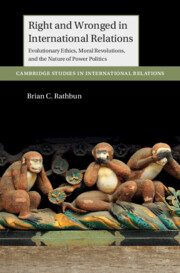 Right and Wronged in International Relations
Right and Wronged in International Relations Book contents
- Right and Wronged in International Relations
- Reviews
- Cambridge Studies in International Relations: 163
- Right and Wronged in International Relations
- Copyright page
- Dedication
- Contents
- Figures
- Tables
- Acknowledgments
- 1 The Nature in and Nature of International Relations
- 2 Lesser Angels
- 3 Mankind Is What Anarchy Makes of It
- 4 See No Evil, Speak No Evil?
- 5 To Provide and to Protect
- 6 Just Desserts in the Desert
- 7 Barking Dogs and Beating Drums
- 8 Biting the Bullet
- 9 Dying in Vain
- 10 Daily Bread
- 11 From Demonizing to Dehumanizing
- Index
- Cambridge Studies in International Relations: 163
10 - Daily Bread
Hitler, Moral Devolution, and Nazi Foreign Policy
Published online by Cambridge University Press: 29 July 2023
- Right and Wronged in International Relations
- Reviews
- Cambridge Studies in International Relations: 163
- Right and Wronged in International Relations
- Copyright page
- Dedication
- Contents
- Figures
- Tables
- Acknowledgments
- 1 The Nature in and Nature of International Relations
- 2 Lesser Angels
- 3 Mankind Is What Anarchy Makes of It
- 4 See No Evil, Speak No Evil?
- 5 To Provide and to Protect
- 6 Just Desserts in the Desert
- 7 Barking Dogs and Beating Drums
- 8 Biting the Bullet
- 9 Dying in Vain
- 10 Daily Bread
- 11 From Demonizing to Dehumanizing
- Index
- Cambridge Studies in International Relations: 163
Summary
A striking number of accounts stress the continuity between the foreign policy of Wilhelmine and Nazi Germany. Hitler was simply a more virulent nationalist and militarist, so some sort of revisionist expansion was inevitable in German foreign policy. The Nazis, however, were a fundamentally different type of right-wing force. Hitler dismissed the very existence of humanitarian ethics as a mere social construction and illusion, refusing even the typical scorn more traditional German nationalists expressed vis-à-vis its wartime adversaries. Hitler’s regime explicitly redefined the national community not as a cultural and linguistic entity but as a biological one. Rather than a continuation of previous tendencies in German nationalism, it was a decisive moral break and led to a wholly different basis for, and type of, international aggression. Hitler dismissed the ambitions of Weimar nationalists of the Wilhelmine variety, whose only interest was to rail against the injustices of the Versailles Treaty and demand the return of lost German lands that were rightly hers. For Hitler, no one had any right to any piece of territory; one simply took it. As a consequence, he defined fundamentally different foreign policy goals than his contemporaries and predecessors: the creation of Lebensraum to provide for Hitler’s growing population.
- Type
- Chapter
- Information
- Right and Wronged in International RelationsEvolutionary Ethics, Moral Revolutions, and the Nature of Power Politics, pp. 296 - 335Publisher: Cambridge University PressPrint publication year: 2023
